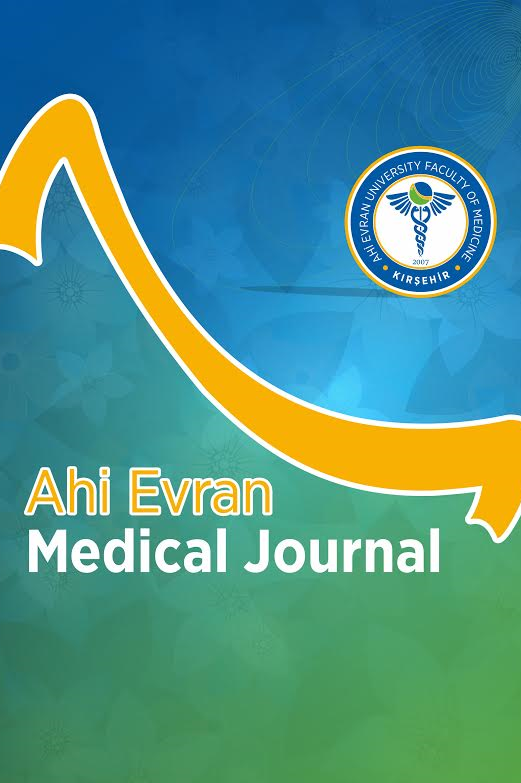Laparoskopik Sleeve Gastrektomi Sonrası Morbid Obez Hastalarda Akdeniz Diyetinin Etkinliği
akdeniz diyeti, bariatrik cerrahi, non-alkolik yağlı karaciğer hastalığı, obezite
The Effectiveness of Mediterranean Diet in Morbid Obese Patients After Laparoscopic Sleeve Gastrectomy
___
- 1. Yıldız S, Çetinkaya F. Yetişkinlerde Obezite ve Yaşam Kalitesinin Değerlendirilmesi. Ahi Evran Med J. 2020; 4(2): 29-34.
- 2. Jakobsen GS, Småstuen MC, Sandbu R, et al. Association of Bariatric Surgery vs Medical Obesity Treatment With Longterm Medical Complications and Obesity-Related Comorbidities.JAMA. 2018;319(3):291–301.
- 3. Schauer PR, Bhatt DL, Kirwan JP et al. Bariatric surgery versus intensive medical therapy for diabetes 5 year outcomes. N Engl J Med. 2017;376:641–651.
- 4. Gagner M. Bariatric Surgery vs Lifestyle Intervention for Type 2 Diabetes Mellitus. JAMA Surg. 2015;150(10):940-940.
- 5. Øvrebø B, Strømmen M, Kulseng B, Martins C. Bariatric surgery versus lifestyle interventions for severe obesity: 5-year changes in body weight, risk factors and comorbidities. Clin Obes. 2017;7(3):183-190.
- 6. The American Society for Metabolic and Bariatric Surgery (ASMBS). Estimate of Bariatric Surgery Numbers, 2011-2018. https://asmbs.org/resources/estimate-of-bariatric-surgery-numbers. Erişim tarihi:20.07.2020
- 7. Mechanick JI, Youdim A, Jones DB, et al. Clinical practice guidelines for the perioperative nutritional, metabolic, and nonsurgical support of the bariatric surgery patient–2013 update— Cosponsored by American Association of clinical endocrinologists, the Obesity Society and American Society for Metabolic and Bariatric Surgery. Surg Obes Relat Dis 2013;9(2):159-191.
- 8. Schiavo, L. Scalera, G. Pilone, V. De Sena, G. Ciorra, F.R. Barbarisi, A. Patient adherence in following a prescribed diet and micronutrient supplements after laparoscopic sleeve gastrectomy: Our experience during 1 year of follow-up. J. Hum Nutr Diet. 2017;30(1):98–104.
- 9. Pintó, X. Fanlo-Maresma, M. Corbella, E.et al. A Mediterranean Diet rich in extra-virgin olive oil is associated with a reduced prevalence of nonalcoholic fatty liver disease in older individuals at high cardiovascular risk. J Nutr. 2019;149(11):1920-1929.
- 10. de Lorgeril M, Renaud S, Memell N, et al. Mediterranean alpha linolenic acidrich diet in secondary prevention of coronary heart disease. Lancet. 1994;343(8911):1454–1459.
- 11. Brea Á, Pintó X, Ascaso JF et al. Nonalcoholic fatty liver disease, association with cardiovascular disease and treatment. (I). Nonalcoholic fatty liver disease and its Association with cardiovascular disease. Clin Investig Arterioscler. 2017;29:141-148.
- 12. Schiavo L, Scalera G, Sergio R, De Sena G, Pilone V, Barbarisi A . Clinical impact of Mediterranean-enriched-protein diet on liver size, visceral fat, fat mass, and fat-free mass in patients undergoing sleeve gastrectomy. Surg Obes Relat Dis.2015;11(5):1164–1170.
- 13. Uylaşer V, Yildiz G. The historical development and nutritional importance of olive and olive oil constituted an important part of the Mediterranean diet.Crit Rev Food Sci Nutr. 2014;54(8):1092–1101.
- 14. Wree A, Broderick L, Canbay A, et al. From NAFLD to NASH to cirrhosis – new insights into disease mechanims. Nat Rev Gastroenterol Hepatol. 2013;10(11):627–636.
- 15. McCarthy EM, Rinella ME. The role of diet and nutrient composition in nonalcoholic fatty liver disease.J Acad Nutr Diet. 2012;112(3):401–409. 16. Kesse-Guyot E, Ahluwalia N, Lassale C, et al. Adherence to mediterranean diet reduces the risk of metabolic syndrome:A 6-year prospective study. Nutr Metab Cardiovasc Dis. 2013; 23(7):677–683.
- 17. Grosso G, Pajak A, Mistretta A, et al. Protective role of the Mediterranean diet on several cardiovascular risk factors: Evidence from Sicily, southern Italy. Nutr Metab Cardiovasc Dis. 2014;24(4):370–377.
- 18. Mathurin P, Gonzalez F, Kerdraon O, et al. The evolution of severe steatosis after bariatric surgery is related to insulin resistance. Gastroenterology. 2006;130(6):1617-1624.
- 19. Kral JG, Sjostrom LV, Sullivan MB. Assessment of quality of life before and after surgery for severe obesity. Am J Clin Nutr. 1992;55(2):611–614.
- 20. Sjostrom CD, Lissner L, Wedel H, Sjostrom L. Reduction in incidence of diabetes, hypertension and lipid disturbances after intentional weight loss induced by bariatric surgery: the SOS Intervention Study. Obes Res.1999;7(5):477–484.
- 21. Lassailly G, Caiazzo R, Buob D et al. Bariatric surgery reduces features of non-alcoholic steatohepatitis in morbidly obese patients. Gastroenterology. 2015;149(2):377-388.
- Yayın Aralığı: Yılda 3 Sayı
- Başlangıç: 2017
- Yayıncı: Kırşehir Ahi Evran Üniversitesi
Sercan ÖZKAÇMAZ, İlyas DÜNDAR, Nazım KANKILIÇ, Mesut ÖZGÖKÇE, Abdullah GÜL, Rahmi ASLAN
Doğum Şeklinin Umbilikal Kord Kanındaki Tiyol-Disulfid Dengesine Etkisi
Selda SONGUR DAĞLI, Recai DAĞLI
Adenotonsiller Hipertrofinin Neden Olduğu Pediatrik OSAS’ın Koroid Kalınlığı Üzerine Etkisi
Sağlıklı Bireylerde İki Farklı Optik Koherens Tomografi Anjiografi Cihazının Karşılaştırılması
Sebile ÇOMÇALI, Cemal ÇAVDARLI, Mehmet Numan ALP
Laparoskopik Sleeve Gastrektomi Sonrası Morbid Obez Hastalarda Akdeniz Diyetinin Etkinliği
Mehmet Nuri KOŞAR, Umut R. GÜNDÜZ, Onur İlkay DİNÇER, Tuğrul ÇAKIR
Tekrarlayan Gebelik Kayıplı Hastalarda Kromozom Analizinin Yeri
Burhan BALTA, Murat ERDOĞAN, Aslıhan KİRAZ, Zeki YILMAZ
Covid 19 Pandemisi Sırasında Kullanılan Farmakolojik Ajanların Gözden Geçirilmesi.
Postoperatif Pulmoner Komplikasyonların Öngörülmesinde Belirteç Karşılaştırılması; Asa ve Ariscat
Editöre Mektup: Kaptoprile Bağlı Gelişen Akut Pankreatit: Olgu Sunumu
Dahiliye Polikliniğine Başvuran Bir Grup Hastanın Depresyon ve Somatizasyon Düzeylerinin İncelenmesi
